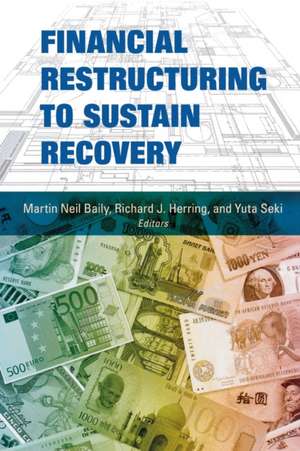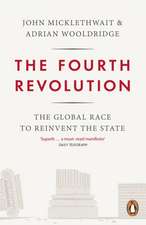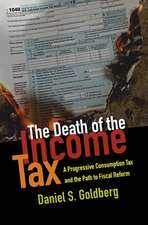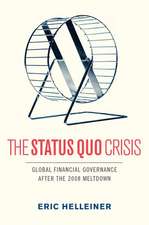Financial Restructuring to Sustain Recovery
Editat de Martin Neil Baily, Richard J. Herring, Yuta Sekien Limba Engleză Paperback – 27 dec 2013
The financial crisis of 2007–08 and the Great Recession caused more widespread economic trauma than any event since the Great Depression. With a slow and uneven recovery, encouraging stability and growth is critical.
Financial Restructuring to Sustain Recovery maintains that while each part of the financial services industry can play a useful role in revving up the U.S. economic engine to full capacity, the necessary reforms are sometimes subtle and often difficult to implement. Editors Martin Neil Baily, Richard Herring, and Yuta Seki and their coauthors break recovery down by three areas:
Restructuring the housing finance market
Reforming the bankruptcy process
Reenergizing the market for initial public offerings
Included are lessons drawn from Japan's experience in overcoming its long-lasting financial crisis after the collapse of its real estate market in the 1990s.
Contributors: Franklin Allen (Wharton School, University of Pennsylvania), James R. Barth (Auburn University College of Business; Milken Institute), Thomas Jackson (Simon School of Business, University of Rochester), Jay R. Ritter (Warrington College of Business, University of Florida), David Skeel (University of Pennsylvania Law School), and Glenn Yago (Milken Institute).
Financial Restructuring to Sustain Recovery maintains that while each part of the financial services industry can play a useful role in revving up the U.S. economic engine to full capacity, the necessary reforms are sometimes subtle and often difficult to implement. Editors Martin Neil Baily, Richard Herring, and Yuta Seki and their coauthors break recovery down by three areas:
Restructuring the housing finance market
Reforming the bankruptcy process
Reenergizing the market for initial public offerings
Included are lessons drawn from Japan's experience in overcoming its long-lasting financial crisis after the collapse of its real estate market in the 1990s.
Contributors: Franklin Allen (Wharton School, University of Pennsylvania), James R. Barth (Auburn University College of Business; Milken Institute), Thomas Jackson (Simon School of Business, University of Rochester), Jay R. Ritter (Warrington College of Business, University of Florida), David Skeel (University of Pennsylvania Law School), and Glenn Yago (Milken Institute).
Preț: 269.81 lei
Nou
Puncte Express: 405
Preț estimativ în valută:
51.64€ • 56.12$ • 43.41£
51.64€ • 56.12$ • 43.41£
Carte tipărită la comandă
Livrare economică 21 aprilie-05 mai
Preluare comenzi: 021 569.72.76
Specificații
ISBN-13: 9780815725244
ISBN-10: 0815725248
Pagini: 181
Ilustrații: Illustrations
Dimensiuni: 152 x 229 x 13 mm
Greutate: 0.27 kg
Editura: Brookings Institution Press
Colecția Brookings Institution Press/Nomura Inst.
ISBN-10: 0815725248
Pagini: 181
Ilustrații: Illustrations
Dimensiuni: 152 x 229 x 13 mm
Greutate: 0.27 kg
Editura: Brookings Institution Press
Colecția Brookings Institution Press/Nomura Inst.
Notă biografică
Martin Neil Baily is a senior fellow in the Economic Studies program and the Bernard L. Schwartz Chair in Economic Policy Development. He is also the director of the Business and Public Policy Initiative at the Brookings Institution. He was chairman of the Council of Economic Advisers from 1999 to 2001. Richard J. Herring is the Jacob Safra Professor of International Banking and professor of finance at the Wharton School, University of Pennsylvania. Yuta Seki is managing director of research at the Nomura Institute of Capital Markets Research in Tokyo.
Descriere
A Brookings Institution Press and Nomura Institute of Capital Markets Research publication
The financial crisis of 2007–08 and the Great Recession caused more widespread
economic trauma than any event since the Great Depression. With a slow and
uneven recovery, encouraging stability and growth is critical.
Financial Restructuring to Sustain Recovery maintains that while each part of the financial services industry can play a useful role in revving up the U.S. economic engine to full capacity, the necessary reforms are sometimes subtle and often difficult to implement. Editors Martin Neil Baily, Richard Herring, and Yuta Seki and their coauthors break recovery down by three areas:
Restructuring the housing finance market
Reforming the bankruptcy process
Reenergizing the market for initial public offerings
Included are lessons drawn from Japan's experience in overcoming its long-lasting financial crisis after the collapse of its real estate market in the 1990s.
Contributors: Franklin Allen (Wharton School, University of Pennsylvania), James R. Barth (Auburn University College of Business; Milken Institute), Thomas Jackson (Simon School of Business, University of Rochester), Jay R. Ritter (Warrington College of Business, University of Florida), David Skeel (University of Pennsylvania Law School), and Glenn Yago (Milken Institute).
The financial crisis of 2007–08 and the Great Recession caused more widespread
economic trauma than any event since the Great Depression. With a slow and
uneven recovery, encouraging stability and growth is critical.
Financial Restructuring to Sustain Recovery maintains that while each part of the financial services industry can play a useful role in revving up the U.S. economic engine to full capacity, the necessary reforms are sometimes subtle and often difficult to implement. Editors Martin Neil Baily, Richard Herring, and Yuta Seki and their coauthors break recovery down by three areas:
Restructuring the housing finance market
Reforming the bankruptcy process
Reenergizing the market for initial public offerings
Included are lessons drawn from Japan's experience in overcoming its long-lasting financial crisis after the collapse of its real estate market in the 1990s.
Contributors: Franklin Allen (Wharton School, University of Pennsylvania), James R. Barth (Auburn University College of Business; Milken Institute), Thomas Jackson (Simon School of Business, University of Rochester), Jay R. Ritter (Warrington College of Business, University of Florida), David Skeel (University of Pennsylvania Law School), and Glenn Yago (Milken Institute).

















